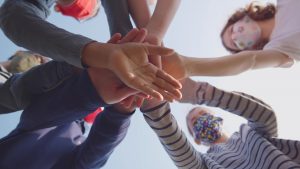Keeping Children in our Community Safe
By Samantha Spolter, MSW, Safer Communities Coordinator and Dawn Levin, Community Liaison, Jewish Children and Family Services Chicago

It has now been over a year for many families that have been sheltering at home and spending unprecedented amounts of time together. Anxiety about health, education, and finances have been high. Many children are still in virtual or hybrid school, meaning they are not interacting with teachers, coaches, and other trusted adults who would normally notice concerns about their well-being and address red flags. At the onset of the pandemic, reports to DCFS concerning child abuse and neglect were down by 50%. Fewer calls reporting child abuse have been received since the outbreak, but that does not mean there’s a decrease in abuse. The pandemic has created the conditions for a rise in child abuse that may go unchecked.
According to a New York Times article written by Dr. Nina Agrawal, a child abuse pediatrician and an assistant professor of pediatrics at Columbia University Medical Center: “When there is household dysfunction – domestic violence, parental substance abuse or mental disorder – the risk of child abuse goes up, and there’s a reason to believe all of these things will increase during this pandemic. For as long as we’re confined to our homes, many parents who are struggling with these issues will no longer have any reprieve from the hard work of keeping children fed, entertained, and educated.”
As a community, we have the opportunity to help children that may typically receive support from their teachers, guidance counselors, coaches or clergy. Teachers are trained to see physical signs of abuse or neglect. In the absence of these advocates interacting with kids in person on a regular basis, a new kind of advocate such as neighbors and friends become even more important than ever. If people are concerned about a particular family, they can help by doing small acts of kindness that may alleviate some stress. Acts of support, whether in the form of an offer to deliver food, coloring books, or to lend a listening ear, can make a huge difference to a stressed-out parent. If concerns are more serious, it is okay to ask a parent, or a child, if they need help.
The pandemic has allowed us to use new tools to ensure that children are safe. It is important to remember that anyone who has knowledge or a reasonable suspicion that a child is being abused or neglected should call the DCFS (Department of Child & Family Services) hotline at 1.800.252.2873. Signs and Symptoms of Child Abuse or Neglect can be found here. If a child is in immediate danger, call 911. Social distancing does not have to mean emotional distancing. We have an opportunity to provide community support for children in our lives. We must keep an eye out for those around us in order to be the protective eyes and ears of children.
For further information on protective factors or more information on child abuse in general, please contact JCFS Chicago Safer Communities department. Please also use the below resources for more information.
- Chicago Children’s Advocacy Center: Support and resources for victims of child abuse and their families: chicagocac.org / 312.492.3700
- Illinois Department of Children & Family Services (DCFS): Hotline for reporting child abuse: 1.800.25.ABUSE (1.800.252.2873)
- JCFS Chicago Safer Communities Coordinator: Training for Professionals and Community Members, consultation. Samantha Spolter, MSW: samanthaspolter@jcfs.org / 847.745.5430
- Zacharias Sexual Abuse Center: Support and resources for victims of sexual assault: zcenter.org / 847.244.1187



